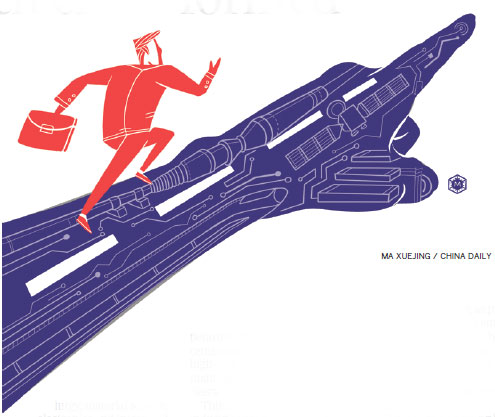Virtuous high-tech circle formed
By Zhang Zhouxiang (China Daily) Updated: 2017-10-13 07:58On Monday, a Long March 2D carrier rocket took off from Jiuquan Satellite Launch Center in Northwest China's Gansu province. It carried Venezuela's second remote-sensing satellite, VRSS-2, which was designed and manufactured by Chinese companies with the cooperation of Venezuela.
According to official data, the annual output value of the domestic satellite industry exceeds 200 billion yuan ($30.4 billion). That's only a small part of the industrial output of the whole high-tech industry, which was 3.47 trillion yuan in 2016.
High-tech industries have been playing an increasingly important role in China's economic growth as well as its restructuring.
First, they account for an increasingly higher percentage of China's economy. In 2016, the industrial output of high-tech industries accounted for 12.8 percent of China's industries above designated size; while its growth rate for the year was 10.8 percent, almost twice that of the total.
Behind that data, thousands of enterprises with low technologies and high pollution have dropped out of the market, while more high-tech companies have started up. In South China's Guangdong province alone, the number of high-tech companies reached 19,857 by the end of 2016, making it the champion of the nation. With the rise of high-tech companies, Guangdong has been taking the lead in the national endeavor to optimize the economic structure.
Second, high-tech products often integrate dozens even hundreds of technologies, which in turn boosts domestic R&D. For example, high-speed railways, one of China's four new inventions, use the latest technologies to make judgments about track conditions, and the materials used for the trains must be able to withstand all weather conditions to ensure safety.
All these have pushed domestic companies to further sharpen their technologies, which in turn are then applied to more sectors to improve people's livelihoods.
Another example is the C919, China's first large passenger jet with full intellectual property rights, which successfully made its debut flight on May 9 taking off from Shanghai Pudong International Airport. Gao Zhenghong, a professor from Northwestern Polytechnical University who led the team that designed the airfoils, said that C919 will boost many technologies such as metallurgy, material science, electronics and integrated circuits, and all these technologies could be applied in other sectors.
The above-mentioned VRSS-2 satellite carries one high-density camera that can take photos clear enough to identify zebra crossings from the outer space, and an ultra-red camera that could distinguish two objects with a temperature gap of 0.2 Celsius centigrade. Both are world-class high-tech products, designed and manufactured by Chinese engineers.
Third, as a result of related industries prospering, the number of people in high-tech jobs has been continually rising. According to the National Bureau of Statistics, the number of high-tech jobs in the manufacturing industry had risen from 12.3 percent in 2007 to 15 percent in 2013. This rising tendency is expected to accelerate in the coming years.
A virtuous circle has been formed in this way, as prosperous high-tech industries employ more college graduates and boost higher education, which in turn improves the quality of China's labor force and keep injecting new vitality into its growth potential.
President Xi Jinping has pointed out the direction for China's future, namely further optimizing its economic structure. The high-tech sector will definitely play a key role in this process.
The author is a writer with China Daily.
zhangzhouxiang@chinadaily.com.cn

- 'Cooperation is complementary'
- Worldwide manhunt nets 50th fugitive
- China-Japan meet seeks cooperation
- Agency ensuring natural gas supply
- Global manhunt sees China catch its 50th fugitive
- Call for 'Red Boat Spirit' a noble goal, official says
- China 'open to world' of foreign talent
- Free trade studies agreed on as Li meets with Canadian PM Trudeau
- Emojis on austerity rules from top anti-graft authority go viral
- Xi: All aboard internet express











